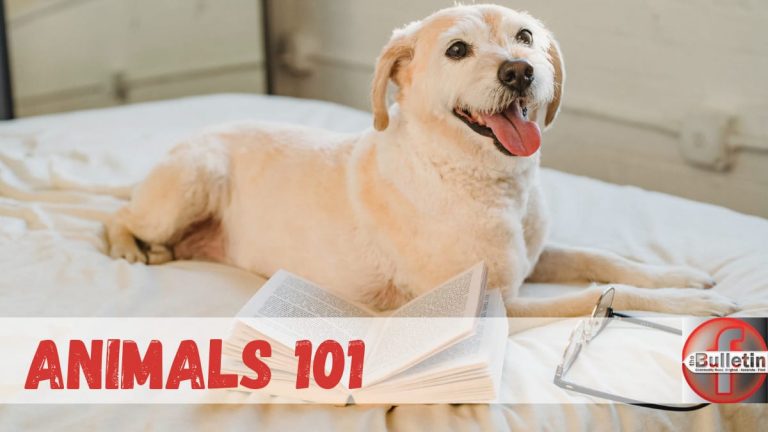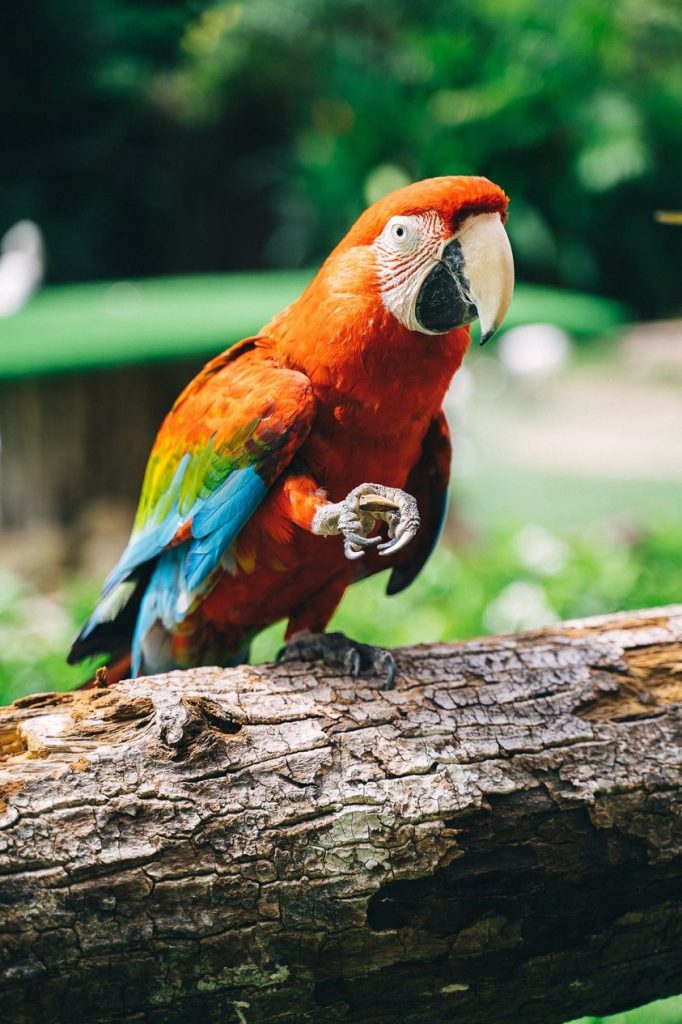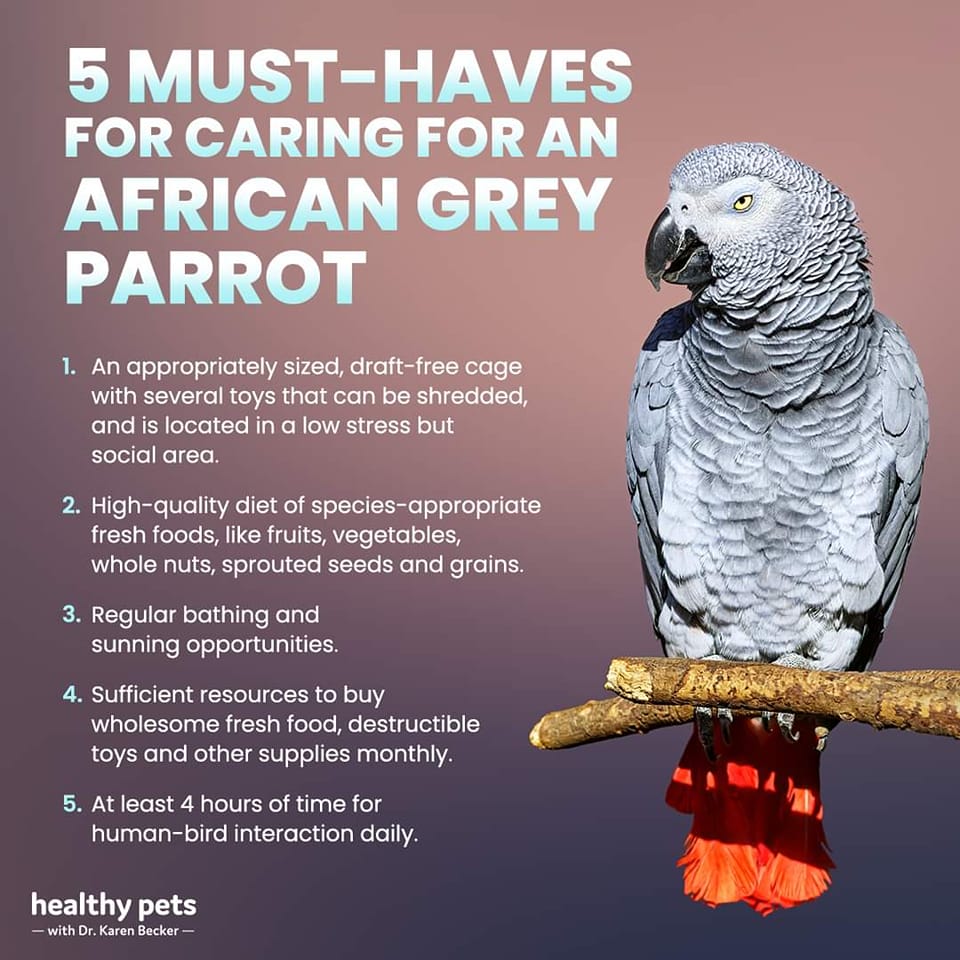
ANIMALS 101 – ADVICE FOR CURRENT OR PROSPECTIVE PARROT PARENTS.
Parrots, especially African Grey parrots are popular pets, but unfortunately, many owners don’t realize the extreme level of care these highly intelligent, high-maintenance birds require.
The combination of their high intelligence and their long life expectancy makes them one of the highest maintenance pets on the planet. Adding inexperienced owners to the mix often results in a long list of behavioural problems, health concerns and unhappiness for both parrot and owner. These animals can easily change homes 6-7 times in their lifetime. The number of surrendered and abandoned birds are sky-high worldwide. Through education and awareness, we want to help change that.
Although we do not support exotic and wild animals as pets, or keeping them in cages, many are captive and that is why it is important to make sure you are ready and realistic about owning a parrot. They are beautiful, adorable and very smart, but they are also:
- Noisy
- Messy
- Require expensive care
- Need lots of time & energy
- Demanding
- Still needs grooming
- Vet care is specialized
- Destructive
- Not ideal for kids
- Become very old (60+)
“Parrots are commonly presented, at veterinary clinics, for feather-destructive behaviour, aggression, inappropriate noise making and/or excessive vocalization, and other behaviour problems — usually more so than for medical illnesses,” writes avian veterinarian Dr. Anthony Pilny.

Two absolute essentials for caring for parrots in captivity are access to an avian veterinarian & a minimum of 4 hours each day spent in human-bird interaction. Other fundamentals include a big monthly bird budget & a cage that is the right size, properly accessorized and well-maintained; and a species-appropriate, healthy diet.
He suggests the following:
- You need an avian vet. Parrots aren’t chickens or small mammals. They have a unique physiology that exotic animal vets are well versed in navigating. Avian veterinarians are better equipped than general small animal vets to diagnose exotics, as well as to understand and interpret behaviour problems and recommend appropriate treatment, enrichment methods, and behaviour counseling.
- Owners and potential owners of parrots need to be thoroughly educated by avian veterinarians and other knowledgeable sources about the parrots’ needs so they know what to expect and how to meet the birds’ requirements in captivity.
- The high cognitive ability of parrots should be considered in their captive husbandry as a contributing factor to developing behaviour concerns. If you’re considering a parrot as a pet, you should be prepared to spend almost the same amount and quality of time with your bird as you would a highly interactive, bright, inquisitive pre-schooler.
FIVE MUST-HAVES FOR CARING FOR PARROTS

- THE CAGE
- An appropriately sized cage that is cozy (draft-free) and located in a safe, low-stress but social area. Your bird’s cage should be big enough for her to spread her wings and flap vigorously without contacting anything. Even better when they can fly in their cage. Remember birds fly more horizontally, so consider this when you buy a cage.
- It should have a variety of natural branch perches (not dowels) and contain several shreddable toys, for example, balsa wood, woven mat toys, paper-stuffed toys, nontoxic enrichment “goodie bags,” and organic hemp rope toys for chewing. A huge variety of organic, all-natural, chemical-free toys are critical, as parrots’ mouths are used as a third hand, so an ongoing supply of safe, nontoxic instantly shreddable, as well as a few resilient or reusable chew toys, are a must.
- He recommends replacing the disposable chews at least daily and rotating the more resilient toys at least twice a week, ideally daily. Always introduce new toys slowly, attaching them to the outside of the cage for a few days first, so your parrot can investigate at his own pace.
- The cage should be cleaned daily with a nontoxic cleaner. His recommendation is diluted vinegar. The cage floor should be lined with newspaper that is discarded daily. All loose material (feathers, leftover feed, bird poop) should be carefully disposed of before disinfecting cage surfaces. Birds should be removed from the area during the disinfecting process to protect them from fumes.
- DIET – Feed a high-quality diet of species-appropriate fresh foods including fruits, vegetables, sprouted seeds, whole nuts and sprouted grains. Organic, dye-free commercial pelleted food (not poor-quality sunflower seed mix, which is the equivalent of junk food for most exotic birds) can also be offered.
- BATHS – Parrots can get dusty, so regular bathing opportunities are important. Many parrots love baths; some will splash around in a tub of shallow water; others will join their owners in the shower and others enjoy a gentle spray from a plant mister. Use filtered water, free from heavy metals and contaminants, and consider adding a flower essence if your bird is stressed.
- MONEY – Beyond the initial expense of acquiring a parrot, owners should plan to spend a lot of money a month on wholesome fresh food, destructible toys, and other supplies. Also an emergency fund or pet medical aid.
- TIME – Just because birds live in cages doesn’t mean they are easy pets to care for. You can’t just pop your parrot into his cage and ignore him except at feeding time. Be prepared to spend a great deal of time interacting with them. Potential owners of parrots should be ready, willing, and able to commit at least 4 hours a day to human-bird contact. This will disqualify many potential owners immediately.
Birds need chemical-free environments to be healthy. Consider the dangers or effects of:
- Tap water
- Home scenting products
- Kitchen cookware
- Fireplaces and smokers
- Home cleaning products
- Air purification
Please think twice and again before committing and if you do…..ALWAYS ADOPT! We will fight not until cages are comfortable, but until they are empty!
Next week we will look at tips for finding missing birds.
Read more on keeping your pets warm in the winter. If you own a bird or want to learn, read more on various bird-related topics here.
WHEN YOU KNOW BETTER, DO BETTER!